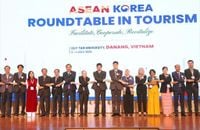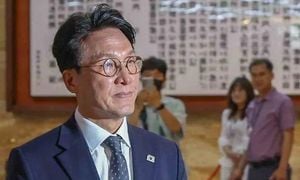On July 2, 2025, Da Nang city in Vietnam became the vibrant hub for international tourism cooperation as Duy Tan University, in partnership with ASEAN and South Korean organizations, launched the inaugural ASEAN-Korea Tourism Roundtable (AK-RT). This landmark event, running through July 4, marks a significant milestone in the comprehensive economic cooperation initiative between ASEAN countries and South Korea, known as AKFTA, which began in August 2024. The roundtable aims to strengthen tourism ties, foster policy dialogue, and boost sustainable development between the two dynamic regions.
The opening ceremony was graced by high-ranking officials, including Deputy Minister of Culture, Sports and Tourism Ho An Phong, who underscored the forum's profound importance. He highlighted that the event is more than just a platform for sharing experiences; it is a testament to the close cooperation and collective commitment between ASEAN and South Korea to advance their tourism sectors. "The first ASEAN-Korea Tourism Forum in Vietnam holds immense significance, not only as a policy dialogue forum among regional nations but also as a vivid demonstration of our shared dedication to tourism development," Ho An Phong remarked.
Former ASEAN Secretary-General Le Luong Minh echoed this sentiment, emphasizing tourism's deeper role beyond economic figures. "Tourism is not just about numbers; it is about value, serving as a cultural bridge and a driving force for sustainable development," he said. Minh expressed hope that the forum would lay a robust foundation for deeper cooperation, blending South Korea's innovative strengths with ASEAN's rich cultural diversity and diverse destinations.
Vice Chairman of the Da Nang City People's Committee, Tran Anh Tuan, also highlighted the strategic significance of the event. He noted that Da Nang, having officially merged with Quang Nam province on July 1, 2025, has become the largest centrally governed city in Vietnam by area, spanning over 11,860 square kilometers and home to approximately 3.1 million residents. The city comprises 94 administrative units at the commune level, including 70 communes, 23 wards, and the Hoang Sa Special Zone.
Tran Anh Tuan outlined Da Nang’s ambitious vision to become a high-quality service and tourism center and a creative destination for both Vietnam and Southeast Asia by 2030. Looking further ahead, the city aims to establish itself as a leading tourism hub in Asia and globally by 2045. To achieve these goals, the municipal government pledges unwavering support for key economic sectors, especially tourism, and prioritizes collaboration with stakeholders to enhance tourism safety, simplify entry procedures, develop multi-modal transportation systems, and harness technology to elevate the experience of both international and domestic visitors.
The roundtable’s agenda was comprehensive, focusing on four pivotal themes critical to shaping the future of tourism in the ASEAN-Korea corridor. Discussions centered on enhancing security and facilitating tourism development, improving infrastructure to enrich tourist experiences, training and developing high-quality tourism human resources, and fostering cultural understanding between ASEAN nations and South Korea. These themes reflect a strategic approach to building a resilient and competitive tourism sector in an era marked by rapid globalization and post-pandemic recovery.
According to Deputy Minister Ho An Phong, the cooperation between ASEAN and South Korea has shown remarkable progress, evidenced not only by the steady recovery and growth in visitor numbers but also by improvements in the quality of tourism products and services. He pointed out that in 2024 alone, ASEAN welcomed nearly 127 million international visitors, with South Korea ranking among the top three source markets, contributing approximately 10 million visitors. Vietnam, in particular, stood out as the preferred destination for South Korean tourists, attracting 4.6 million visitors—a clear indicator of the deepening strategic partnership and mutual trust between the two countries.
The event also highlighted the critical role of educational institutions and professional communities in driving tourism development. The organization of this first-ever ASEAN-Korea tourism workshop in Vietnam, hosted by Duy Tan University and sponsored by the Korean Ministry of Foreign Affairs and the AKFTA ASEAN-Korea Fund, represents a significant step toward connecting organizations, academia, and industry experts. It provides a vital platform for policymakers, scholars, and business leaders to exchange expertise, forge partnerships, and propose practical policy recommendations that will guide the sustainable recovery and growth of tourism in the region.
Beyond economic and policy discussions, the forum emphasized the cultural dimension of tourism as a bridge linking peoples and fostering mutual understanding. This aspect is crucial for nurturing long-term cooperation and ensuring that tourism development respects and celebrates the rich diversity of cultures across ASEAN and South Korea.
Vice Chairman Tran Anh Tuan expressed confidence in the forum’s potential to generate lasting benefits. He praised the efforts of Passage to ASEAN (P2A) and Duy Tan University in bringing the event to fruition and affirmed the city’s commitment to supporting initiatives that promote sustainable and inclusive tourism growth. "We expect the forum to yield positive outcomes that will benefit all stakeholders and drive comprehensive development of the ASEAN-Korea tourism sector," he said.
As the roundtable concluded its initial sessions, the atmosphere was one of optimism and determination. The collaborative spirit evident among the participants signals a promising future for tourism cooperation between ASEAN and South Korea. With shared goals, innovative strategies, and strong institutional support, the region is poised to unlock its vast tourism potential, creating economic opportunities, preserving cultural heritage, and enhancing people-to-people connections.
In the face of evolving global challenges and opportunities, the ASEAN-Korea Tourism Roundtable has set a dynamic precedent for multilateral engagement. It stands as a beacon of how regional partnerships, grounded in mutual respect and shared vision, can pave the way for sustainable growth and prosperity. As Da Nang positions itself at the forefront of this movement, the city’s transformation into a premier tourism and innovation hub will undoubtedly inspire other regions to follow suit.




